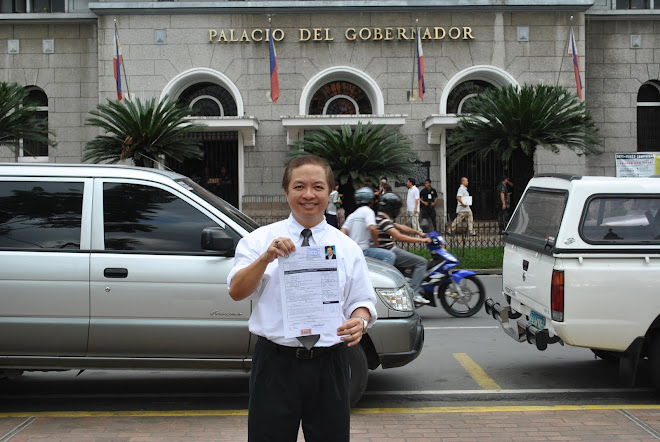Monday, September 29, 2008
COA: P444-M DA funds diverted to 16 private groups!
By Jess Diaz Monday, September 22, 2008
At least P444 million in taxpayers’ money released to the Department of Agriculture (DA) in 2007 was diverted to 16 private foundations, many of which could not be located and therefore could not account for the money. The amount is part of more than P600 million in agriculture-related funds given by DA Secretary Arthur Yap to local government units and so-called "people’s organizations” like foundations.
Of the P600 million, some P235 million was released “prior to the May 2007 (congressional-local) elections,” according to the one-inch-thick consolidated annual audit report of the Commission on Audit (COA) on DA funds, a copy of which The STAR has obtained. The COA said a big part of the money that went to private foundations came from the Priority Development Assistance Fund (PDAF) of members of the House of Representatives. The lawmakers’ funds were released to Yap’s agency because they were to be used for its projects, principally the GMA (Ginintuang Masaganang Ani) rice production enhancement program.
Auditors named the biggest recipient-organization as Antipolo Philanthropy Foundation, Inc. (APFI) and its chairman as a certain Johnny Tan. It received a total of P146 million in 2007 and an additional P30 million this year.
A COA team did not find the foundation’s office in the Antipolo City address it listed in documents submitted to the DA. Instead, they found a school occupying the place. On Dec. 27, 2007, the DA released to the Antipolo foundation P16 million “even without the benefit of a MOA (memorandum of agreement)… to the disadvantage of the government,” auditors reported.
They said of the P16 million, P4 million “was from the PDAF of the 2nd district of Antipolo City,” while P12 million was from the GMA program. The second district was represented by former Antipolo mayor Angelito Gatlabayan, a neophyte congressman.
The DA-RFU (Regional Field Unit) IV did not monitor the fund transfers to APFI, resulting in the accumulation of unliquidated cash advances in the amount of P146,600,000. Despite non-liquidation of previous fund transfers, the DA-RFU IV released the amount of P30 million (to APFI) in February 2008,” they added.
The other private groups that received funds from Yap’s office were National Organization for Agricultural Enhancement and Productivity, Inc., which got P44 million; Commoners Foundation, Inc., P9.1 million; Las Marias Foundation, Inc., P34 million; Coprahan and Gulayan Foundation, Inc., P31 million; Gabay Masa Development Foundation, P5 million; Samahan ng Manininda ng Prutas at Gulay sa Gabi, Inc., P20 million; and Aaron Foundation, Inc. (no amount indicated).
The COA said these foundations, together with APFI, which were supposed to implement agriculture-related projects worth P289.8 million, “were of questionable legitimacy.” "SEC (Securities and Exchange Commission) confirmation negative,” auditors reported when they checked the registration papers of Commoners Foundation and Las Marias Foundation. They could not locate the other fund recipients.
Other private organizations that received funds from DA were Unlad Quezon Foundation, P10 million; Mula sa Puso Foundation (amount not indicated); Bantayog Kalinga Foundation, P5 million; Kamama Foundation, P30 million; Encima Lhea Care Foundation, P2.1 million, JR and JP Enterprises, P13.6 million; Kapuso at Kapamilya Foundation, P13 million; and Buhay Ko, Mahal Ko Foundation, P10 million.
Auditors questioned the use of the last two foundations, which they said were located in Metro Manila. “Since the beneficiaries are Bohol constituents, there is no acceptable reason for the transfer of funds from RFU VII (Central Visayas) to Nabcor (National Agribusiness Corp., a DA agency) and finally to NGOs located in Metro Manila,” they said.
Unlad Quezon Foundation was supposed to implement “Sagip Hanapbuhay,” a project of Quezon Rep. Danilo Suarez in Tiaong town. However, auditors reported that most of the alleged beneficiaries did not receive funds.
In the case of JR and JP Enterprises, Kamama Foundation, Encima Lhea Care Foundation and Samahan ng mga Manininda ng Prutas sa Gabi, RFU VII gave them P55.7 million to buy vegetable seeds, planting materials, organic fertilizer, and irrigation pumps.
Auditors discovered the purchases were overpriced by P28.2 million. The 2007 irregularities were a repeat of the anomalies COA uncovered in 2004 in the use of P728 million in fertilizer funds the DA released to more than 100 congressmen-allies of President Arroyo and more than 50 pro-administration governors and mayors.
Several of the foundations involved in last year’s alleged fund diversion were used four years ago by many politicians to skim tens of million of pesos from the fertilizer funds that they received.
The COA report showed that last year’s fund misuse is not confined to the program called GMA, which, ironically are President Arroyo’s initials.
Irregularities were found in almost all DA projects, including farm-to-market roads, irrigation canals and pumps, corn production, seed and fertilizer procurement, and post-harvest facilities.
Where’s the money COA, meanwhile, is questioning the National Power Corp. (Napocor) why the P250 million revenues it had collected have not been remitted to the Department of Energy.
COA said the failure of Napocor to remit the funds, which should have earned interest, is a violation of the Electric Power Industry Reform Act (EPIRA).
State auditors said they have been reminding these agencies of their obligations since 2004.
“Up to now the NPC does not render a full accounting of the funds,” the COA stated. The COA reported that the funds worth more than P117 million that had been validated were spent for projects. Auditors explained that at the DOE, the funds that are not yet due for release to the project beneficiaries, are invested in high yield treasury bills to earn interest income.
The COA report also stressed the DOE should have demanded from Napocor a full accounting of its administered funds.
"The DOE shall demand from the NPC the immediate turnover of the fund balances to the DOE upon complete validation pursuant to... the EPIRA Law,” COA said. – With Reinir Padua
At least P444 million in taxpayers’ money released to the Department of Agriculture (DA) in 2007 was diverted to 16 private foundations, many of which could not be located and therefore could not account for the money. The amount is part of more than P600 million in agriculture-related funds given by DA Secretary Arthur Yap to local government units and so-called "people’s organizations” like foundations.
Of the P600 million, some P235 million was released “prior to the May 2007 (congressional-local) elections,” according to the one-inch-thick consolidated annual audit report of the Commission on Audit (COA) on DA funds, a copy of which The STAR has obtained. The COA said a big part of the money that went to private foundations came from the Priority Development Assistance Fund (PDAF) of members of the House of Representatives. The lawmakers’ funds were released to Yap’s agency because they were to be used for its projects, principally the GMA (Ginintuang Masaganang Ani) rice production enhancement program.
Auditors named the biggest recipient-organization as Antipolo Philanthropy Foundation, Inc. (APFI) and its chairman as a certain Johnny Tan. It received a total of P146 million in 2007 and an additional P30 million this year.
A COA team did not find the foundation’s office in the Antipolo City address it listed in documents submitted to the DA. Instead, they found a school occupying the place. On Dec. 27, 2007, the DA released to the Antipolo foundation P16 million “even without the benefit of a MOA (memorandum of agreement)… to the disadvantage of the government,” auditors reported.
They said of the P16 million, P4 million “was from the PDAF of the 2nd district of Antipolo City,” while P12 million was from the GMA program. The second district was represented by former Antipolo mayor Angelito Gatlabayan, a neophyte congressman.
The DA-RFU (Regional Field Unit) IV did not monitor the fund transfers to APFI, resulting in the accumulation of unliquidated cash advances in the amount of P146,600,000. Despite non-liquidation of previous fund transfers, the DA-RFU IV released the amount of P30 million (to APFI) in February 2008,” they added.
The other private groups that received funds from Yap’s office were National Organization for Agricultural Enhancement and Productivity, Inc., which got P44 million; Commoners Foundation, Inc., P9.1 million; Las Marias Foundation, Inc., P34 million; Coprahan and Gulayan Foundation, Inc., P31 million; Gabay Masa Development Foundation, P5 million; Samahan ng Manininda ng Prutas at Gulay sa Gabi, Inc., P20 million; and Aaron Foundation, Inc. (no amount indicated).
The COA said these foundations, together with APFI, which were supposed to implement agriculture-related projects worth P289.8 million, “were of questionable legitimacy.” "SEC (Securities and Exchange Commission) confirmation negative,” auditors reported when they checked the registration papers of Commoners Foundation and Las Marias Foundation. They could not locate the other fund recipients.
Other private organizations that received funds from DA were Unlad Quezon Foundation, P10 million; Mula sa Puso Foundation (amount not indicated); Bantayog Kalinga Foundation, P5 million; Kamama Foundation, P30 million; Encima Lhea Care Foundation, P2.1 million, JR and JP Enterprises, P13.6 million; Kapuso at Kapamilya Foundation, P13 million; and Buhay Ko, Mahal Ko Foundation, P10 million.
Auditors questioned the use of the last two foundations, which they said were located in Metro Manila. “Since the beneficiaries are Bohol constituents, there is no acceptable reason for the transfer of funds from RFU VII (Central Visayas) to Nabcor (National Agribusiness Corp., a DA agency) and finally to NGOs located in Metro Manila,” they said.
Unlad Quezon Foundation was supposed to implement “Sagip Hanapbuhay,” a project of Quezon Rep. Danilo Suarez in Tiaong town. However, auditors reported that most of the alleged beneficiaries did not receive funds.
In the case of JR and JP Enterprises, Kamama Foundation, Encima Lhea Care Foundation and Samahan ng mga Manininda ng Prutas sa Gabi, RFU VII gave them P55.7 million to buy vegetable seeds, planting materials, organic fertilizer, and irrigation pumps.
Auditors discovered the purchases were overpriced by P28.2 million. The 2007 irregularities were a repeat of the anomalies COA uncovered in 2004 in the use of P728 million in fertilizer funds the DA released to more than 100 congressmen-allies of President Arroyo and more than 50 pro-administration governors and mayors.
Several of the foundations involved in last year’s alleged fund diversion were used four years ago by many politicians to skim tens of million of pesos from the fertilizer funds that they received.
The COA report showed that last year’s fund misuse is not confined to the program called GMA, which, ironically are President Arroyo’s initials.
Irregularities were found in almost all DA projects, including farm-to-market roads, irrigation canals and pumps, corn production, seed and fertilizer procurement, and post-harvest facilities.
Where’s the money COA, meanwhile, is questioning the National Power Corp. (Napocor) why the P250 million revenues it had collected have not been remitted to the Department of Energy.
COA said the failure of Napocor to remit the funds, which should have earned interest, is a violation of the Electric Power Industry Reform Act (EPIRA).
State auditors said they have been reminding these agencies of their obligations since 2004.
“Up to now the NPC does not render a full accounting of the funds,” the COA stated. The COA reported that the funds worth more than P117 million that had been validated were spent for projects. Auditors explained that at the DOE, the funds that are not yet due for release to the project beneficiaries, are invested in high yield treasury bills to earn interest income.
The COA report also stressed the DOE should have demanded from Napocor a full accounting of its administered funds.
"The DOE shall demand from the NPC the immediate turnover of the fund balances to the DOE upon complete validation pursuant to... the EPIRA Law,” COA said. – With Reinir Padua
Subscribe to:
Post Comments (Atom)










No comments:
Post a Comment